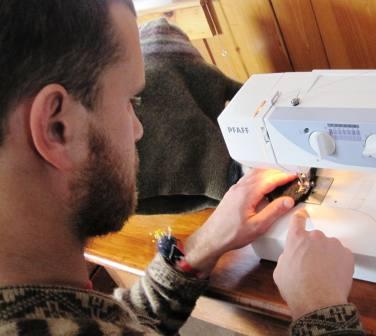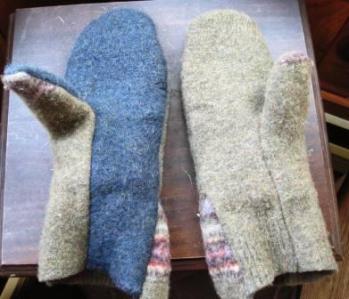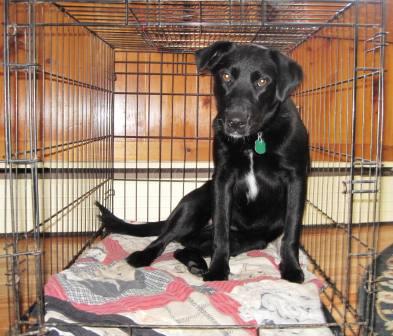
Ian is sewing some of the shrunken wool. At left is the sweater I used for my mittens, before cutting.
One of my clients just decided to give up her paid job and focus on taking care of her children. It’s an investment in the future and the present. By reducing the stress, she can take better care of herself and her marriage, then take better care of the children. With less money and more time.
Time is love. Good parenting is all about time. Love is spelled T-I-M-E.

My finished mittens lined with fleece with a shrunken sweater shell. I used fancy yarn from the yoke, and a darker sweater for the left mitten because after I took them apart AGAIN, I needed more material. Because they're original, they will not get stolen at a ski area.
The more money you have, the more you spend. The less money you have, the more carefully you spend it and the more you learn to do yourself. The most important things in life are not things.
Doing-it-yourself can be fun — like the mittens my son Ian is sewing. He saw me cutting out the fleece liners for a pair of ski mittens and said, “I want a pair, too.”
Ian and I spent an afternoon together designing and redesigning the mittens, then fitting them and re-designing them. It would have been easier to download a mitten pattern or buy one for a few bucks!
Ian is just as comfortable sewing mittens as he is building a door and installing it. They are SO WARM! I’ve had two pair of expensive mittens stolen from ski areas. These are steal-proof.
Here’s how to do it:
1. Get from your closet or a thrift shop a few 100% wool sweaters with some design if possible. Wash it on the hottest cycle and dry it in the dryer.
2. Get a mitten pattern at a store or download one. Make the mitten lining out of fleece — any color. Make the outer shell slightly larger and longer. Mittens take very little fabric.
3. Sew the two together. Adjust the design if necessary. Add elastic if you want. Wear and be warm. Enjoy spending time with your child, tween or teen on this project.
We have spent more time than money with our kids and have taught them to “do it yourself.” I don’t know if our marriage could have survived the stress of two careers. Someone has to take care of the family and marriage. The myth of superwoman is just that, a myth.


